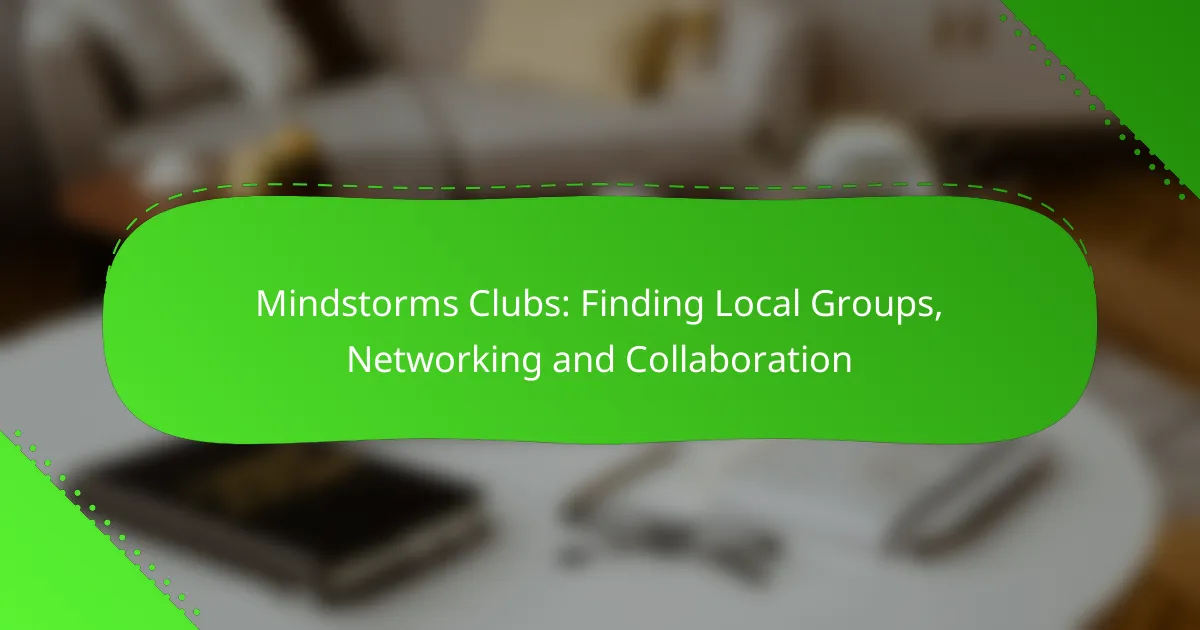Finding Mindstorms Clubs in your area can be straightforward by exploring various local resources and online platforms. Engaging with community centers, social media, and dedicated events can help you connect with like-minded enthusiasts. If you can’t find an existing club, consider starting your own by gathering a group of robotics and programming enthusiasts to organize regular meetings and activities for collaboration and skill development.
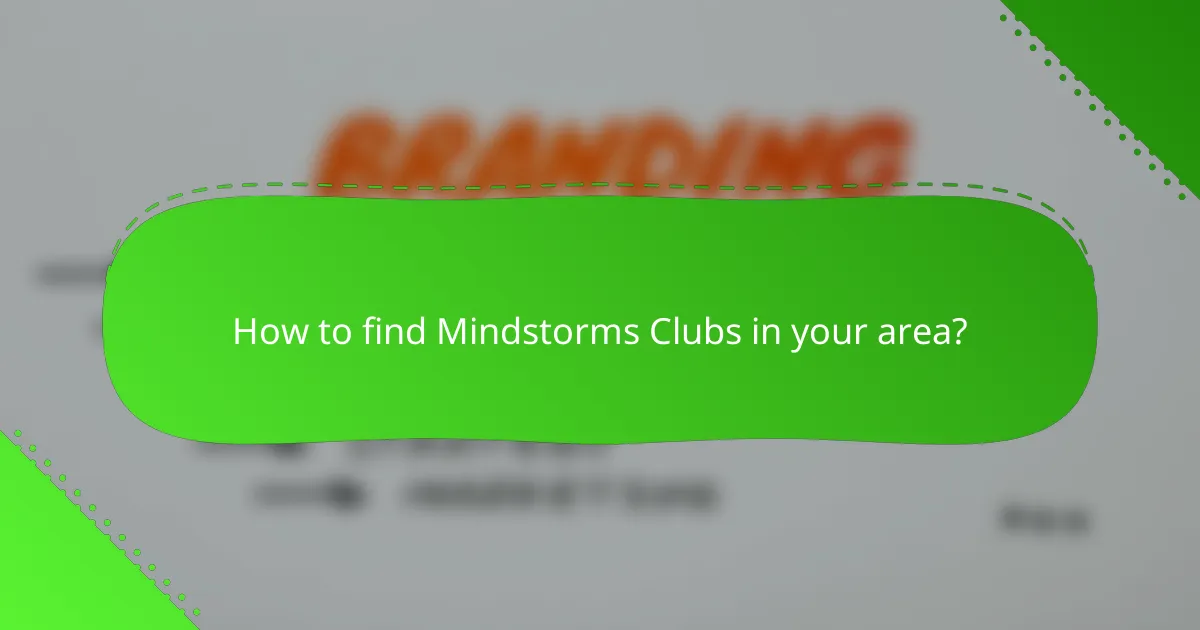
How to find Mindstorms Clubs in your area?
Finding Mindstorms Clubs in your area can be straightforward by exploring various local resources and online platforms. Engaging with community centers, social media, and dedicated events can help you connect with like-minded enthusiasts.
Local community centers
Local community centers often host robotics clubs or workshops that include LEGO Mindstorms activities. Check bulletin boards or websites of these centers for announcements about upcoming events or clubs.
Many community centers offer programs for different age groups, so look for those that cater to children, teens, or even adults interested in robotics. Participation fees can vary, but they are typically affordable, often ranging from free to a modest monthly fee.
Online platforms like Meetup
Meetup is a popular platform for finding local groups focused on specific interests, including Mindstorms. You can search for robotics or LEGO-related groups in your area and join them to stay updated on events and meetings.
When using Meetup, consider the group’s activity level and member engagement. Look for groups with regular meetups and active discussions to ensure a vibrant community experience.
Social media groups
Social media platforms like Facebook and Reddit host numerous groups dedicated to LEGO Mindstorms. Joining these groups can provide insights into local clubs, events, and collaborative projects.
Engage with the community by asking questions or sharing your projects. This interaction can lead to valuable networking opportunities and potential collaborations with other enthusiasts nearby.
LEGO Education events
LEGO Education frequently organizes events and workshops that focus on robotics and programming, which can be a great way to meet others interested in Mindstorms. Check their official website for information on upcoming events in your region.
Participating in these events not only enhances your skills but also connects you with educators and fellow learners who share your passion for robotics. Keep an eye out for both in-person and virtual events to maximize your networking opportunities.
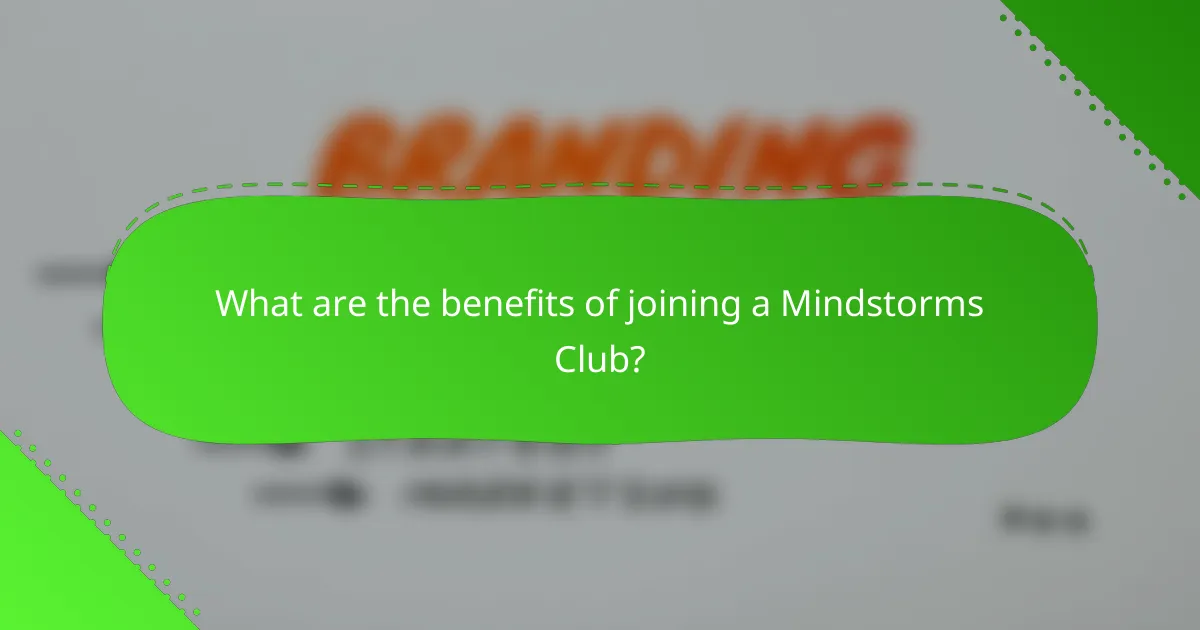
What are the benefits of joining a Mindstorms Club?
Joining a Mindstorms Club offers numerous advantages, including enhanced networking, collaboration on projects, skill development, and access to valuable resources. These benefits can significantly enrich your experience with Mindstorms robotics and foster a supportive community.
Networking opportunities
Mindstorms Clubs provide excellent networking opportunities, allowing members to connect with like-minded individuals who share a passion for robotics. Engaging with others can lead to friendships, mentorships, and potential partnerships on future projects.
Participating in local meetups or online forums can expand your network beyond your immediate area, connecting you with enthusiasts and professionals from various backgrounds. This can also open doors to competitions, workshops, and events where you can showcase your skills.
Collaborative projects
Collaborative projects are a hallmark of Mindstorms Clubs, enabling members to work together on innovative designs and solutions. These projects can range from building robots for competitions to creating community service initiatives that utilize robotics for local needs.
Working in teams fosters creativity and problem-solving skills, as members learn to share ideas and tackle challenges collectively. It’s also a great way to gain hands-on experience and learn from others’ strengths and expertise.
Skill development
Joining a Mindstorms Club can significantly enhance your technical skills in programming, engineering, and design. Members often engage in workshops and training sessions that cover various aspects of robotics, from basic coding to advanced engineering principles.
Regular participation in club activities allows for continuous learning and improvement. Members can receive constructive feedback from peers, which is invaluable for personal growth and skill enhancement.
Access to resources
Mindstorms Clubs often provide access to resources that may not be available to individuals working alone. This can include shared tools, kits, and software licenses, as well as educational materials and guides.
Many clubs also have partnerships with local schools or organizations, which can lead to additional resources such as funding for projects or access to specialized equipment. Utilizing these resources can greatly enhance your robotics projects and overall learning experience.
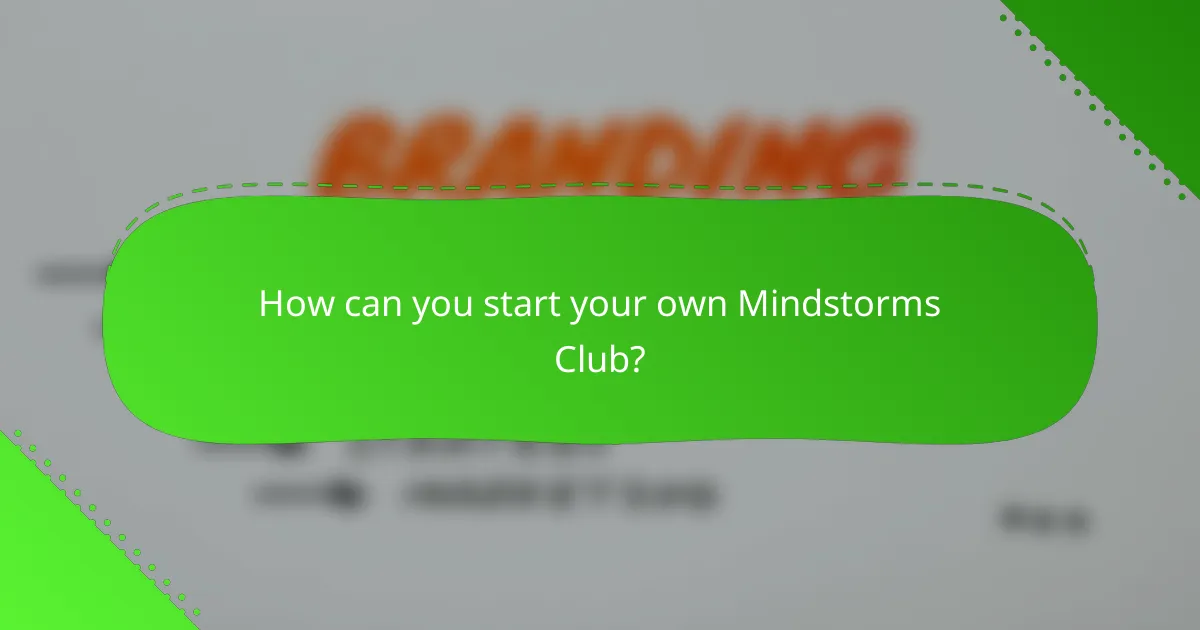
How can you start your own Mindstorms Club?
Starting your own Mindstorms Club involves gathering a group of enthusiasts who share an interest in robotics and programming. By organizing regular meetings and activities, you can foster collaboration and skill development among members.
Gather interested members
To form a Mindstorms Club, begin by identifying potential members who are passionate about robotics. You can reach out to local schools, community centers, or online forums to find individuals interested in joining.
Consider hosting an introductory meeting to gauge interest and discuss the club’s goals. Aim for a diverse group that includes various skill levels, as this can enhance learning and collaboration.
Choose a meeting location
Selecting a suitable meeting location is crucial for your club’s success. Look for spaces that are accessible and equipped with necessary resources, such as tables, power outlets, and internet access.
Community centers, libraries, or school classrooms can be excellent venues. Ensure the location is comfortable and conducive to hands-on activities, allowing members to work on their projects effectively.
Plan activities and projects
Engaging activities and projects are essential for keeping club members motivated. Consider organizing workshops, competitions, or collaborative projects that challenge members to apply their skills.
Examples of activities include building specific robots, programming challenges, or even participating in local robotics competitions. Regularly rotating activities can help maintain interest and encourage skill development.
Utilize online tools for organization
Online tools can significantly enhance your club’s organization and communication. Platforms like Slack, Discord, or Google Groups can facilitate discussions, share resources, and schedule meetings.
Additionally, consider using project management tools like Trello or Asana to track progress on club projects. These tools help keep everyone informed and engaged, ensuring that tasks are completed efficiently.
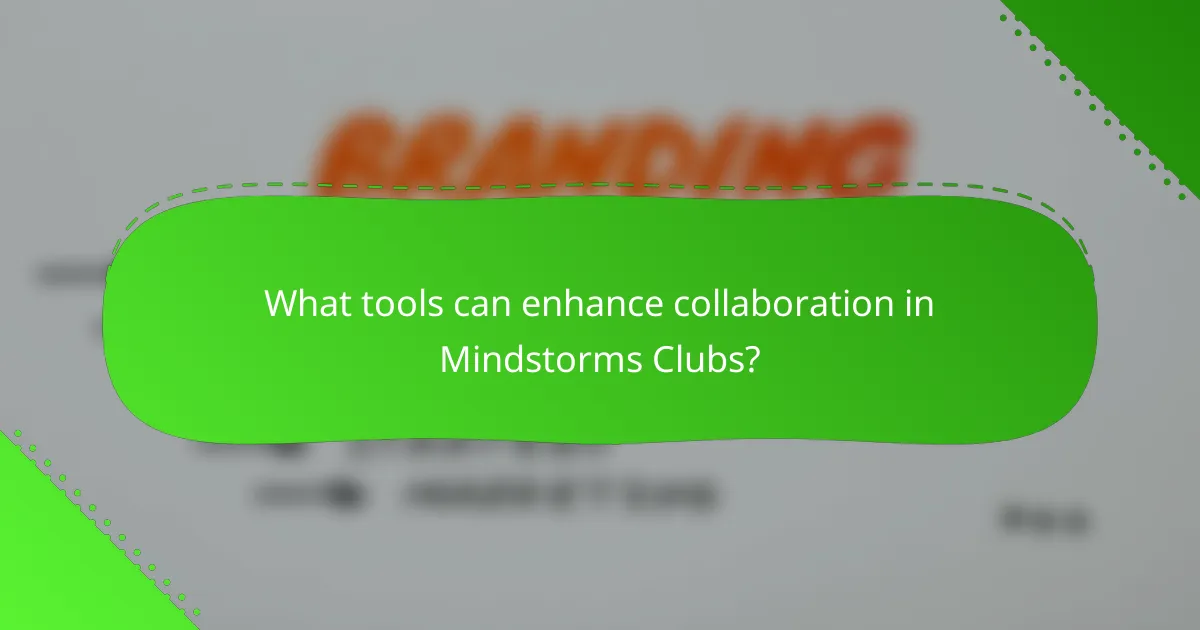
What tools can enhance collaboration in Mindstorms Clubs?
Effective collaboration in Mindstorms Clubs can be significantly improved by utilizing specific tools designed for communication, project management, and software development. These tools streamline workflows, enhance communication, and facilitate project tracking among club members.
LEGO Mindstorms software
The LEGO Mindstorms software is essential for programming robots and developing projects within clubs. It provides a user-friendly interface that allows members to create, test, and refine their robot designs and programming. Familiarity with this software can enhance collaboration by ensuring all members can contribute effectively to the project.
Consider organizing workshops to help club members master the software. This can include tutorials on basic programming concepts, as well as advanced techniques for more experienced users. Regular practice sessions can foster a collaborative environment where members share tips and tricks.
Collaboration platforms like Slack
Collaboration platforms such as Slack facilitate real-time communication among club members, making it easier to share ideas and updates. These platforms allow for the creation of channels dedicated to specific projects or topics, which helps keep discussions organized and focused.
When using Slack, establish guidelines for communication to ensure that conversations remain productive. Encourage members to share progress updates, ask questions, and provide feedback in designated channels. This can help maintain engagement and foster a sense of community within the club.
Project management tools like Trello
Project management tools like Trello are invaluable for tracking tasks and project milestones in Mindstorms Clubs. Trello’s visual boards allow members to see the status of various tasks at a glance, making it easier to manage deadlines and responsibilities.
To maximize the effectiveness of Trello, create boards for each project and assign tasks to specific members. Regularly review the boards during club meetings to discuss progress and adjust timelines as necessary. This practice helps ensure accountability and keeps everyone aligned on project goals.
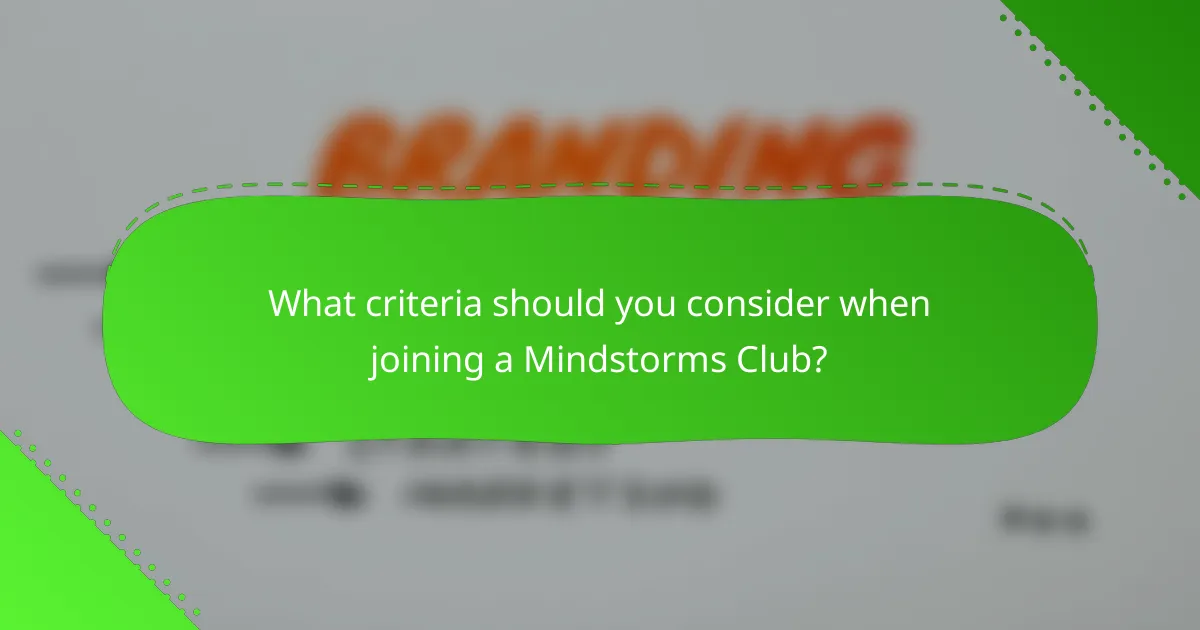
What criteria should you consider when joining a Mindstorms Club?
When joining a Mindstorms Club, consider factors like location accessibility, club size and member engagement, and the specific projects the club focuses on. These criteria will help ensure that you find a group that aligns with your interests and logistical needs.
Location accessibility
Location accessibility is crucial when selecting a Mindstorms Club. Look for clubs that are conveniently located near your home or school to minimize travel time and costs. Consider whether the club meets in a public space, such as a community center or library, which can also enhance accessibility for all members.
Additionally, check if the club has flexible meeting times that accommodate your schedule. Clubs that meet during weekends or after school hours may be more accessible for students or working professionals.
Club size and member engagement
The size of a Mindstorms Club can significantly impact your experience. Smaller clubs often foster closer relationships and more hands-on engagement, while larger clubs may offer a wider variety of resources and expertise. Aim for a club size that feels comfortable for you, whether that’s a tight-knit group or a larger community.
Member engagement is equally important. Look for clubs where members actively participate in discussions, share ideas, and collaborate on projects. You can gauge this by attending a meeting or reaching out to current members to ask about their experiences.
Focus on specific projects
Different Mindstorms Clubs may have varying focuses, such as robotics competitions, educational outreach, or creative building projects. Identify what types of projects interest you most and seek clubs that align with those interests. This will enhance your motivation and enjoyment in participating.
Consider asking potential clubs about their current and past projects. A club that regularly engages in competitions or showcases can provide valuable experience and opportunities for skill development. Look for clubs that encourage innovation and creativity in their project choices.
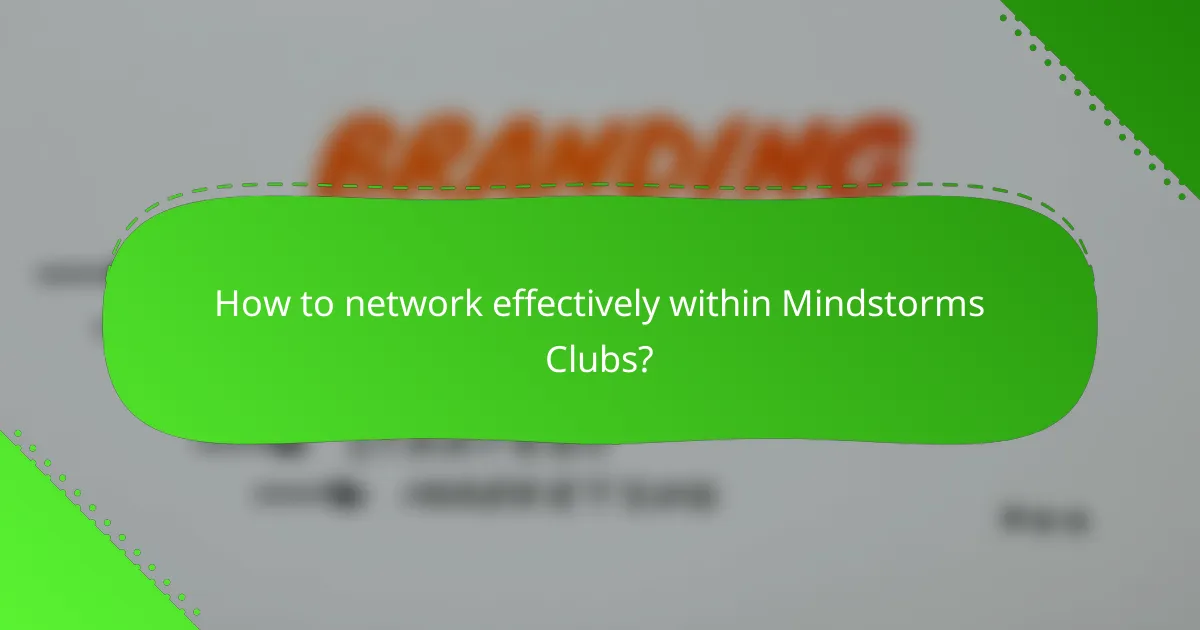
How to network effectively within Mindstorms Clubs?
Networking within Mindstorms Clubs involves building relationships with fellow members to share knowledge, resources, and opportunities. Effective networking can enhance collaboration and lead to innovative projects.
Join Local Events and Workshops
Participating in local events and workshops is a great way to meet other Mindstorms enthusiasts. Look for gatherings organized by clubs or educational institutions that focus on robotics and programming.
These events often provide hands-on experiences and allow you to engage directly with others who share your interests. Check community centers, schools, or online platforms for upcoming events in your area.
Utilize Online Platforms
Online platforms can significantly expand your networking opportunities. Websites like Meetup, Facebook groups, and dedicated forums for Mindstorms users can connect you with local clubs and members.
Engage in discussions, share your projects, and seek advice. Being active in these online communities can lead to valuable collaborations and friendships.
Collaborate on Projects
Collaborating on projects is an effective way to strengthen your network within Mindstorms Clubs. Teaming up with others allows you to combine skills and resources, leading to more complex and rewarding projects.
Consider forming small groups to tackle specific challenges or participate in competitions together. This not only enhances your learning but also builds lasting relationships with fellow members.
Share Knowledge and Resources
Sharing your knowledge and resources can foster a supportive environment in your Mindstorms Club. Offer to lead workshops or share tutorials on specific topics you are knowledgeable about.
Encourage others to do the same, creating a culture of learning and collaboration. This mutual exchange strengthens connections and enhances the overall experience for all members.
